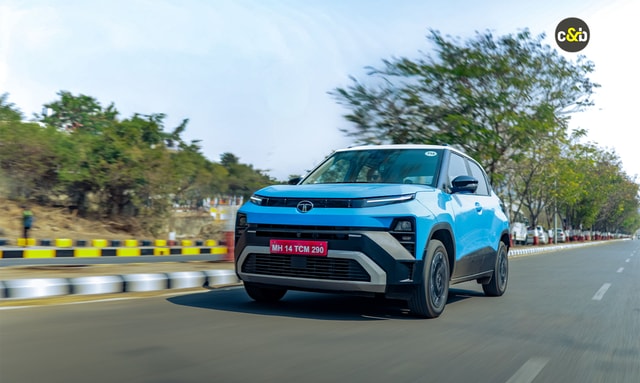Nitrogen VS Air | Which Is Better For Your Car Tyres?

- Air is easily available and cheap
- Nitrogen improves tyre quality
- Nitrogen or air doesnt matter, tyre pressure does. Dont neglect it.
Drivers around the world have been involved in long-drawn arguments over whether to use air or Nitrogen in their car tyres. Undecided, if you have turned to social media, it hasn't been of any concrete help, for sure. Claims for both sides are made and there is no right answer. Well, we are here to put an end to this debate and give you one right answer.

Photo Credit: unsplash.com
Air In Tyres
Motorists have preferred normal, everyday air forever and have not complained. Compressed air is available easily and literally costs nothing. These air-filling ports can often be seen at petrol pumps across the country, offering air free of cost.

Photo Credit: unsplash.com
Advantages:
- Easily available
- Cheap
Disadvantages:
- Can leak out
- Oxidising tyres, leading to tyre-wear
- Temperature affects tyre pressure
Nitrogen In Tyres
The purest form of Nitrogen is non-combustible, non-reactive inert gas and has been used in aircrafts, commercial vehicles, and race cars for a long time. Nitrogen is now available in India as an alternative to air in car tyres.

Photo Credit: unsplash.com
Advantages:
- No leaks or loss of pressure
- Non-reactive
- No moisture, so no corrosion
- Cooler
Disadvantages:
- Expensive
- Scarcely available
- Cannot be mixed with air
- Often mixed with impurities
Which Should You Choose?

Photo Credit: unsplash.com
Every type of tyre contains microscopic pores. Over time, any gas you fill will seep through them, eventually reducing tyre pressure. If you want to maintain the inflation pressure, use Nitrogen instead. Nitrogen has larger gas molecules and moves slower through your tyres than air.
Nitrogen can be particularly beneficial if you come under any of the following categories:
- You have at least one vehicle that you primarily use on the racetrack.
- You rarely drive your vehicle and it remains unused for extensive periods.
- You have a collectible vehicle that you rarely drive through any great distance.
- You leave your vehicle without using it for significant lengths of time.
However, If your travel includes ‘home-office-home' on a daily basis, then the cost of Nitrogen outweighs any benefit it can provide. Any savings you'd have on fuel will be so insignificant that you won't even notice the difference. Although Nitrogen has been known to provide a better-quality ride, there is very little evidence to support these claims.
There is no single right or wrong answer when it comes to this debate. The most important aspect of tyre management is ensuring your car tyres are at optimum pressure always, no matter whether you use Nitrogen or compressed air. When you have a properly inflated tyre, you will notice that your tire will wear evenly with time, improve fuel economy of your car, handle terrain better and last longer.
Latest News
 Jafar Rizvi | Feb 7, 2026Nissan Gravite Interior Spotted Ahead Of February 17 DebutThe Gravite’s interior appears to carry over the familiar layout from the pre-facelift Renault Triber, with only minor updates expected.2 mins read
Jafar Rizvi | Feb 7, 2026Nissan Gravite Interior Spotted Ahead Of February 17 DebutThe Gravite’s interior appears to carry over the familiar layout from the pre-facelift Renault Triber, with only minor updates expected.2 mins read car&bike Team | Feb 7, 2026Jawa 730 Twin UnveiledJawa Moto has introduced the 730 Twin, the fourth model in its lineup to be based on the 750 platform.2 mins read
car&bike Team | Feb 7, 2026Jawa 730 Twin UnveiledJawa Moto has introduced the 730 Twin, the fourth model in its lineup to be based on the 750 platform.2 mins read car&bike Team | Feb 6, 2026Indian Motorcycle Parts Ways With PolarisAs America’s first motorcycle brand prepares to celebrate its 125th anniversary, Indian Motorcycle has parted ways with former parent Polaris to become an independent company.1 min read
car&bike Team | Feb 6, 2026Indian Motorcycle Parts Ways With PolarisAs America’s first motorcycle brand prepares to celebrate its 125th anniversary, Indian Motorcycle has parted ways with former parent Polaris to become an independent company.1 min read car&bike Team | Feb 6, 2026BMW F 450 GS Based Sportbike Spotted On TestThe upcoming supersport machine is expected share the same parallel-twin engine with the upcoming BMW F 450 GS.1 min read
car&bike Team | Feb 6, 2026BMW F 450 GS Based Sportbike Spotted On TestThe upcoming supersport machine is expected share the same parallel-twin engine with the upcoming BMW F 450 GS.1 min read car&bike Team | Feb 6, 2026Tata Sierra Bookings Cross 1 Lakh Mark; Production Ramped UpWith bookings now in six-digit territory, Tata Motors is moving ahead with a phased ramp-up in production, while working through supplier-related constraints.1 min read
car&bike Team | Feb 6, 2026Tata Sierra Bookings Cross 1 Lakh Mark; Production Ramped UpWith bookings now in six-digit territory, Tata Motors is moving ahead with a phased ramp-up in production, while working through supplier-related constraints.1 min read car&bike Team | Feb 6, 2026Mahindra To Set Up Its Biggest Automobile Plant In Nagpur; Production To Begin In 2028The new facility will support next-generation platforms from the brand and will be capable of manufacturing multiple powertrains including ICE, EV & future technologies1 min read
car&bike Team | Feb 6, 2026Mahindra To Set Up Its Biggest Automobile Plant In Nagpur; Production To Begin In 2028The new facility will support next-generation platforms from the brand and will be capable of manufacturing multiple powertrains including ICE, EV & future technologies1 min read
 Bilal Firfiray | Feb 4, 2026Volkswagen Tayron R-Line Review: Sensible Flagship For IndiaVolkswagen has introduced a made-in-India flagship SUV that offers space, comfort, performance, and German driving finesse in a practical three-row package. But is the Tayron R-Line good enough?6 mins read
Bilal Firfiray | Feb 4, 2026Volkswagen Tayron R-Line Review: Sensible Flagship For IndiaVolkswagen has introduced a made-in-India flagship SUV that offers space, comfort, performance, and German driving finesse in a practical three-row package. But is the Tayron R-Line good enough?6 mins read Preetam Bora | Feb 2, 2026TVS NTorq 150 Road Test Review: Bigger, Better & More Efficient!We test the new TVS NTorq 150 out in the real world to get a sense of what it offers in terms of performance, dynamics and fuel economy.7 mins read
Preetam Bora | Feb 2, 2026TVS NTorq 150 Road Test Review: Bigger, Better & More Efficient!We test the new TVS NTorq 150 out in the real world to get a sense of what it offers in terms of performance, dynamics and fuel economy.7 mins read Bilal Firfiray | Jan 21, 2026Tata Punch Facelift Review: New Turbo Engine; Same Old SoulWith the update, the Tata Punch facelift retains its character of being a healthy runabout, which is perfect for Indian roads. But have these changes made it any better?7 mins read
Bilal Firfiray | Jan 21, 2026Tata Punch Facelift Review: New Turbo Engine; Same Old SoulWith the update, the Tata Punch facelift retains its character of being a healthy runabout, which is perfect for Indian roads. But have these changes made it any better?7 mins read Amaan Ahmed | Jan 17, 2026Bajaj Chetak C25 First Ride Review: Basic, Likeable E-Scooter For First-Time RidersThe Chetak C25, in quite a few ways, is poles apart from the larger and more powerful 30 and 35 Series models, but in its mannerisms, it is very much a Chetak.8 mins read
Amaan Ahmed | Jan 17, 2026Bajaj Chetak C25 First Ride Review: Basic, Likeable E-Scooter For First-Time RidersThe Chetak C25, in quite a few ways, is poles apart from the larger and more powerful 30 and 35 Series models, but in its mannerisms, it is very much a Chetak.8 mins read Bilal Firfiray | Jan 9, 2026Toyota Urban Cruiser Hyryder: 10,000 km Long-Term ReviewAfter spending over three months and 10,000 km with the Toyota Urban Cruiser Hyryder Hybrid, we were impressed by its real-world mileage, seamless hybrid, practical comfort, and Toyota reliability. Is it the best C-SUV then?5 mins read
Bilal Firfiray | Jan 9, 2026Toyota Urban Cruiser Hyryder: 10,000 km Long-Term ReviewAfter spending over three months and 10,000 km with the Toyota Urban Cruiser Hyryder Hybrid, we were impressed by its real-world mileage, seamless hybrid, practical comfort, and Toyota reliability. Is it the best C-SUV then?5 mins read




























































































































